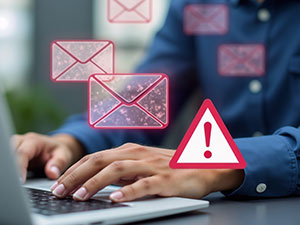 Have you ever opened an email attachment without a second thought? Maybe it looked like an invoice, a message from a supplier, or even a document from a co-worker. If so, you’re not alone—and cybercriminals are counting on that.
Have you ever opened an email attachment without a second thought? Maybe it looked like an invoice, a message from a supplier, or even a document from a co-worker. If so, you’re not alone—and cybercriminals are counting on that.
In today’s digital world, phishing attacks are evolving fast, and one of the latest tricks is particularly sneaky: corrupted Microsoft Word files that bypass email security filters and deliver malware straight to your system.
What Is a Corrupted Attachment Scam?
This phishing method involves sending a corrupted or "broken" Word document via email. Because the file is technically damaged, email scanners can’t properly analyze it, allowing it to land in your inbox undetected.
When you open it, Microsoft Word attempts to "repair" the file, displaying what appears to be a legitimate document. Hidden inside, however, is a malicious link or QR code—usually directing you to a fake Microsoft 365 login page. If you enter your credentials, scammers can access your account and infiltrate your entire business network.
Why Phishing Attacks Are So Dangerous for Businesses
Once hackers get into a single employee’s account, the consequences can be devastating:
- Unauthorized access to sensitive customer data
- Distribution of more phishing emails using your domain
- Locked or encrypted files via ransomware
- Potential legal and financial liabilities
- Reputational damage that can take years to repair
Phishing is one of the most common cybersecurity threats facing businesses today, and it's growing more sophisticated every year.
How to Protect Your Business From Email Scams
You don’t need to be a cybersecurity expert to stay safe. A few proactive steps can make all the difference:
- Think before you click. Always pause before opening attachments or clicking on links—especially from unknown or unexpected senders.
- Beware of urgency. Phishing emails often use pressure tactics (“Act now!”) to rush your decision-making.
- Verify authenticity. If you're unsure about an email, call or message the sender directly using a known, trusted contact method.
- Don't be fooled by appearances. Just because an email looks professional doesn’t mean it's legitimate.
- Educate your team. We provide weekly cybersecurity training to help your employees stay alert and build strong, lasting security habits—keeping your business safer from evolving threats.
Cybersecurity Support for Small Businesses
At Computer Services Unlimited, we help small and mid-sized businesses protect their systems, data, and reputations from evolving cyber threats. From employee training to managed security solutions, our team is here to ensure your business stays secure.
Need help protecting your inbox from the latest phishing scams? Contact us today for a free consultation.
